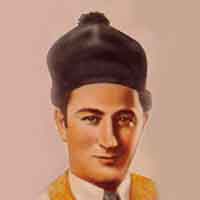Moishe Oysher (1907, Lipkany, Bessarabia, Imperial Russia — 27 November 1958, New Rochelle, New York, USA).[1] He is considered one of the most entertaining chazanim (cantors) ever recorded. It is said that there were chazanim in his family going back six generations.
In 1921, he traveled to Canada with his family and joined a traveling Yiddish theatrical company. In 1932. he started his own company and traveled to South America. After returning from South America to the U.S., he took a job as a chazan for the High Holidays at the First American-Roumanian congregation, in Manhattan, New York, on the Lower East Side.
Some say that Oysher’s voice was like the “roaring of the lion.” He liked the jazz style, popular at that time, and he used similar rhythmic melodies in his prayers, respecting always the traditional Bessarabian “Doinas” and “Nussach” moods of the prayers.
He starred in three Yiddish films and also made many recordings.
- The Cantor’s Son (Dem Khazn’s Zindl) 1937, USA, B&W, 90 min, Yiddish with English subtitles. ISBN 1-56082-079-9
- The Singing Blacksmith (Yankl der Shmid; the Yiddish title literally means “Yankel the Smith”) 1938, USA, B&W, 95 min, Yiddish with English subtitles. ISBN 1-56082-085-3
- Overture to Glory (Der Vilner Shtot Khazn; the Yiddish title literally means “The Vilna City Cantor”) 1940, USA, B&W, 85 min, Yiddish with English subtitles. ISBN 1-56082-063-2
Directed by Ilya Motyleff and Sidney Goldin. Other actors: Judith Abarbanel and Florence Weiss. Based on Moishe Oysher’s life. A very poor young immigrant lands a job as a custodian, where he is “discovered” and becames famous immediately. However, his success seems meaningless as he yearns for home.
Directed by Edga G. Ulmer. Also with Miriam Riselle and Florence Weiss. This is a classic story of a blacksmith that is a womanizer and almost an alcoholic. One day, he meets a beautiful lady called Tamare and his life changes.
Directed by Max Nosseck. Starring Helen Beverly and Florence Weiss. Oysher is the “Vilner Balabesl”, a cantor in Vilna, with a renowned voice. Two men come from the Warsaw Opera to hear him sing the “Kol Nidre” on Yom Kippur and are so impressed that they introduce him to European classical music and to reading sheet music; they convince him, against the wishes of much of his family (and especially his father-in-law) to become an opera singer in Warsaw.
He leaves his job as the Vilna cantor, and seems at first to be on the path to fame and fortune as an opera star in Warsaw, when the news arrives that his son has died. Grief-stricken, he stumbles over the aria he is supposed to sing, starting instead into a lullaby he used to sing to his son. In disgrace, he also loses his voice; he tries to return to his life in Vilna; finally, his voice comes briefly back to him on Yom Kippur. He sings the first few lines of the “Kol Nidre”, then dies of a heart attack.


10 thoughts on “Kaminos”
Was Nicholas related to Alexander Saslavsky who married Celeste Izolee Todd?
Anyone have a contact email for Yair Klinger or link to score for Ha-Bayta?
wish to have homeland concert video played on the big screen throughout North America.
can organize here in Santa Barbara California.
contacts for this needed and any ideas or suggestions welcomed.
Nat farber is my great grandpa 😊
Are there any movies or photos of max kletter? His wife’s sister was my stepmother, so I’m interested in seeing them and sharing them with his wife’s daughter.
The article says Sheb recorded his last song just 4 days before he died, but does not tell us the name of it. I be curious what it was. I’d like to hear it.
Would anyone happen to know where I can find a copy of the sheet music for a Gil Aldema Choral (SATB) arrangement for Naomi Shemer’s “Sheleg Al Iri”. (Snow on my Village)?
Joseph Smith
Kol Ram Community Choir, NYC
שלום שמעון!
לא שכחתי אותך. עזבתי את ישראל בפברואר 1998 כדי להביא את בני האוטיסט לקבל את העזרה המקצועית שלא הייתה קיימת אז בישראל. זה סיפור מאוד עצוב וטרגי, אבל אני הייתי היחיד עם ביצים שהביא אותו והייתי הורה יחיד בשבילו במשך חמישה חודשים. הוא היה אז בן 9. כעת הוא בן 36 ומתפקד באופן עצמאי. נתתי לו הזדמנות לעתיד נורמלי. בטח, אבות כולם חרא, אומרים הפמינציות, אבל כולם צריכים לעבוד כמטרות במטווחי רובה!
משה קונג
(Maurice King)
Thank you for this wonderful remembrance of Herman Zalis. My late father, Henry Wahrman, was one of his students. Note the correct spelling of his name for future reference. Thank you again for sharing this.
Tirza Wahrman (Mitlak)
amazing zchuso yagein aleinu, he wrote the famous niggun Lefichuch that is sung in almost every Israeli Yeshiva